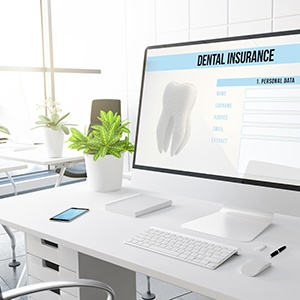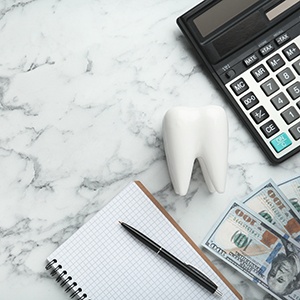Emergency Dentist Los Gatos
Treating Your Hurt Smile with Urgency

Life has a knack for throwing unexpected curveballs our way every once in a while, and occasionally, they come in the form of a dental emergency. These situations shouldn’t be taken lightly; when your smile is in trouble, your very livelihood could be at stake!
Fortunately, Dr. Herrera and our team offer same-day emergency dentistry and a wide range of treatments capable of addressing all kinds of urgent scenarios. If you or someone close to you has suffered a dental disaster, don’t wait to contact our office in Los Gatos.
Why Choose Cristina Herrera, DDS for Emergency Dentistry?
- Emergency Dentist with 25+ Years of Experience
- Same-Day Emergency Dental Appointments
- Dental Insurance Accepted and Flexible Financing
Preventive Dentistry Restorative Dentistry Missing Tooth Replacement Cosmetic Dentistry Orthodontics View Our Services
How We Treat Dental Emergencies

If you or someone you know has suffered a dental emergency in Los Gatos, we encourage you to follow these three simple steps:
- Call Our Office Without Delay – As soon as you’ve realized your smile is injured, call our office and describe your symptoms. We’ll tell you whether you need to come see us on that very same day or not and also provide first-aid tips over the phone if necessary.
- Attend Your Emergency Appointment – Once you’ve arrived, Dr. Herrera can quickly perform an emergency examination to determine the extent of the damage. Don’t worry, she’ll also relieve any discomfort you may be feeling, all while coming up with a treatment plan.
-
Receive the Care Your Smile Needs – It might take one or multiple treatments to resolve things; however, we’re committed to sending you back into the world with a pain-free and problem-free smile!
The Most Common Dental Emergencies
In some cases, you may suffer a dental injury that isn’t causing painful symptoms. However, this doesn’t mean you should ignore it; your lack of pain could mean that there’s something very serious going on behind the scenes. Don’t hesitate to contact Dr. Herrera and our office to inform us about what happened. We’ll let you know when you need to come in and provide you with some quick first-aid tips over the phone.
In the meantime, here’s a list of some of the most common dental emergencies that we can treat here in our Los Gatos office:
Keys to Preventing Dental Emergencies

After years and years of helping patients with all kinds of dental trouble – from small toothaches to completely knocked-out teeth – we know first-hand just how stressful and painful it can be to need emergency dentistry. That’s why Dr. Cristina Herrera and the rest of our team go the extra mile to make getting the care you need as comfortable as possible. We also try to share helpful tips on how to prevent common dental injuries entirely, including:
Visit Your Dentist Every Six Months

One of the first steps we recommend taking is scheduling an appointment with us every six months. That way, we can routinely check for tooth decay, damaged restorations, gum disease, and the like. Additionally, our dental hygienists use these visits to remove plaque and tartar, which helps to keep your teeth and gums healthy as well. So, even though it seems inconsequential, your biannual visits to our office play a big role in preventing serious dental injuries.
Maintain Good Oral Hygiene At Home

Another great way to keep your teeth and gums healthy is to commit to a good oral hygiene regimen at home. Naturally, that starts with habits like brushing and flossing consistently. However, preventing cavities and other common dental problems requires more than that. For example, you also need to replace your toothbrush (or toothbrush head) so you aren’t using old, frayed, and dirty bristles to clean your teeth.
Avoid Extremely Crunchy Foods

Hard pretzels, raw almonds, peanut brittle, and other extremely crunchy foods can cause your teeth to chip or crack, which is why we recommend avoiding them or – at the very least – exercising caution when eating them. It’s important to also incorporate lots of softer, nutrient-dense foods into your diet to keep your teeth strong and your gums healthy, like bananas, oatmeal, cooked carrots, plain yogurt, and strawberries.
Wear a Mouthguard During Sports

Even if you participate in a non-contact sport, like skateboarding, you need to wear a mouthguard. That way, your teeth are protected from unforeseen impact, like a bad fall. The good news is that we can have a custom one made for you to ensure that it’s the appropriate thickness, that it fits comfortably, and that it effectively protects your smile from serious harm.
Break Unhealthy Dental Habits

Finally, do your best to break unhealthy dental habits. A few examples include biting your nails, chewing on ice cubes, smoking, and using your teeth to remove bottle caps. If this proves to be difficult, don’t hesitate to reach out to our emergency dentist in Los Gatos, Dr. Herrera. She’d be happy to provide you with helpful recommendations and tips!
Understanding the Cost of Emergency Dentistry

It’s very common for patients to be concerned about the cost of their care, especially if they need extensive restorative care. Rest assured, our Los Gatos dental team will provide you with an estimate upfront and review all of the financial solutions available at your appointment. We will also answer any questions you have, so don’t hesitate to get in touch! If you want to learn a little more on the topic before doing so, then read on.
Why Every Dental Emergency is Different

Since no two cases are exactly the same, no two treatment plans are the same. That’s why there isn’t a flat fee for emergency dentistry! Instead, the cost is determined by the type of dental injury, the severity of the damage, and the treatment (or treatments) needed.
Once you arrive at our office, we will alleviate any pain you’re experiencing and conduct a comprehensive oral exam. Then, we will share our findings and recommendations before providing you with an estimate of the cost. If you have any questions about your treatment options or the financial solutions available, we will provide you with the answers you’re looking for before moving forward.
Does Dental Insurance Cover Dental Emergencies?

Many dental insurance providers cover the cost of one emergency dental exam a year as well as upwards of 80% of the cost of essential restorative care. That said, there is usually red tape to consider as well, like waiting periods and annual maximums. So, it’s important to look through the fine print on your plan to see what is and isn’t covered. If you need any help, let us know! We’re in-network with Delta Dental Premier and can help patients who are out-of-network maximize their benefits as well.
Other Options for Making Dental Emergencies Affordable

Don’t let a lack of dental insurance stop you from getting the dental care you need! We happily accept CareCredit, which is a trusted third-party financier. That way, our patients can space out the cost into smaller chunks that fit in their monthly budget. If you are interested in learning more about this financial solution, let us know! We can provide you with further details, answer any questions you have, and show you where to sign up.
How Taking Care Of Your Smile Can Save You Money

Remember, the more time that passes, the worse the root of the problem will get. That’s why it’s crucial that you don’t take the “wait and see” approach. Instead, contact us when you first notice that something isn’t right – whether it’s pain when chewing or blood when flossing. That way, we can determine what the culprit is as well as the best way to address it.
Good oral hygiene habits, like brushing and flossing each night before bed, will also go a long way when it comes to protecting your teeth and gums from harm. So, if you haven’t already, take a good look at your daily routine to see where there is room for improvement!
Dental Emergency FAQs
How Should I Sleep with Tooth Pain?
Although we don’t recommend trying to “sleep off” a toothache, we also know getting to our office the same day for an exam isn’t always possible. If that’s the case, you still need to get a good night’s sleep in the meantime. Fortunately, there are a few steps you can take to prevent discomfort, sensitivity, and soreness from keeping you up, like:
- Taking OTC pain medication about 30 minutes before bed
- Drinking room-temperature water
- Not eating anything sweet, like ice cream
- Using a cold compress for 10 minutes at a time
- Keeping your head elevated while you sleep
What if My Toothache Suddenly Disappears?
Patients often assume that, if the pain is gone, so is the root of the problem. That’s not the case! In fact, if your toothache has gone radio silent, it’s more important than ever that you schedule an appointment with our emergency dentist in Los Gatos. After all, this is usually a warning sign that the nerve of your tooth has been “killed,” and there is only a small window of time where your tooth can be saved.
Can I Pop a Dental Abscess on My Own?
Since popping a dental abscess on your own can expose your mouth to more bacteria and allow the infection to spread throughout your throat, neck, and head, we strongly advise against it. Instead, give us a call so we can schedule an emergency appointment with Dr. Herrera. From there, she can determine what steps need to be taken to eliminate the infection, like carefully opening and draining the abscess.
What If I Can’t Afford Emergency Dentistry?
Remember, the longer you wait to schedule an appointment, the more time the root of the problem has to progress. So, the best thing for your smile and your wallet is to get the restorative care you need when you first notice that something is wrong – whether it’s a slight pain when biting down or a significant crack in your enamel. At your appointment, we will review your treatment options, create your custom treatment plan, and provide you with an estimate of the cost. From there, we can review the financial solutions available.
At our Los Gatos dental office, we are proud to be in-network with Delta Dental Premier. We also welcome flexible financing with CareCredit, which means you don’t have to pay for the entire cost of your emergency treatment in one lump sum. If you’d like to learn more about either of these options, just let us know – we’re here to help!
What Does Chronic Bad Breath Mean?
While an untreated oral health problem could be the culprit, it’s also possible for the unpleasant odor to be due to something else, like your diet. So, if you haven’t already, try removing pickles, garlic, onions, and other pungent foods from your meals. Simultaneously, focus on taking great care of your teeth and gums, starting with brushing for two full minutes each morning and evening. If the odor on your breath persists, then give us a call so we can schedule an exam.
